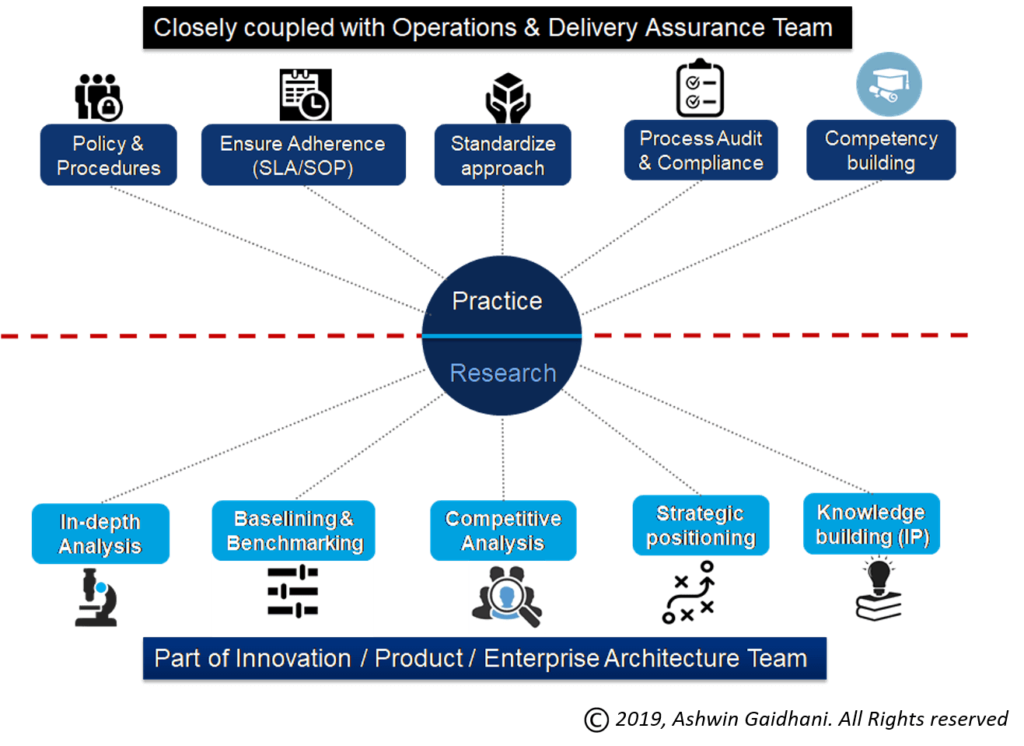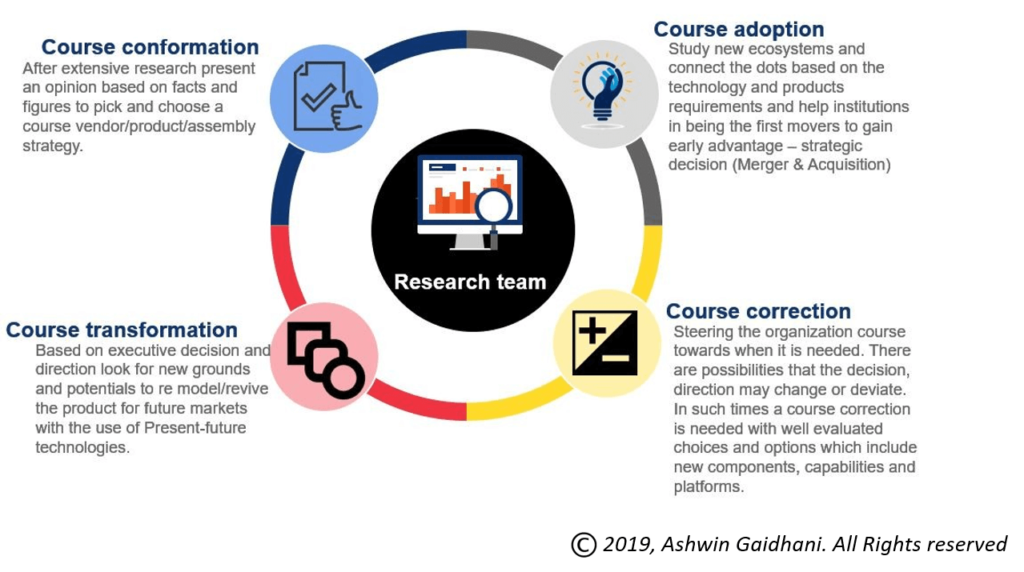
Research Teams – The lighthouse of your organization
Everyone is in the transformation race, and no one wants to lose or come even close. We are in the business of continuous success and growth. Most of us have mastered the art of doing things right – and now we have to start doing the right things. For that matter, any industry is compelled to build desirable, relevant, and long-lasting products/services, but most of them are living in a world of now. I am ecstatic that most organizations have always accepted the Research team’s importance, which helps them plan for tomorrow. However, what about those who are on the path of thinking.
Who is exploring the technology, economic and scientific worlds to keep track of discoveries, revelations, transformation & new engineering in the respective domain?
Little difference is perceived between a product and services companies in the present times. New products and services are using new-age technologies and capabilities to address customer problems. Regardless, all organizations are neck-deep into the building and facilitating today’s market requirements (at this moment) and near tomorrow. I estimate that 90% of the organization’s effort is engaged in design, delivery, support, and operations activities for all existing range of products. When engineering, platform, and innovation teams are busy building new options, there has to be a guiding light who positions you to build a unique and relevant product for future times with an ability to accommodate integration, scalability, and linkages with other technologies. Similarly, the institutions should know how much to invest in “The product” based on
1. Market appreciation
2. where to start/stop enhancing (How much improvement is a good improvement)
3. when to start building the new one.
Someone has to keep an eye on the surrounding play area, so we do not build something already in the market and thrive. We do not invest our efforts and finance into an already available concept for a competitive price. Research teams can provide insight, opinion, Factsheet, and guidance in such decisions.

IMHO (In my humble opinion), Research and practice team are two different groups with different agendas in mind. Few companies might use these words interchangeably as the practice team is mainly related to the technology service provider entities and delivery assurance setup. They are used to run the operating framework, sharing best practices, adherence & compliance, and new inclusion in the respective domain. There can be a practice team for each function in the IT service provider area.
Usually, the research team extends the pointers and leads to the practice team based on which they decide the respective offerings’ benchmarks. I will not discount the effort that the practice team carries out a few research tasks but required.
Pardon me as I am not defining the role and actions of practice or research teams but expressing my own opinion, which I have gathered from my personal experience, study, and setups that I have encountered. The activities of practice and research team can coincide at many points and complement each other, but there is a fine line that has to be understood between them.
These research teams gather information using an exploratory, experiential, and evolutionary study that supports compiling knowledge. This presents the directions and dimensions of a subject that will help the executive leadership make a well-informed and calculated decision/s. There is a vast quantity of information available, but a specific and little information is needed to make that million-dollar decision. Research groups filter the information, share what is useful, and conduct a thorough analysis from various angles to present the executive summary. Especially in the disruptive technology world, there is very little that we know of them, and on the contrary, there is immense knowledge & data available to understand them better. In-depth study of technology and its application, components, and combinations, Research teams convince institutions to take the risk as anything new might not work, but that is a well-calculated risk.
The research team can act as a lighthouse that helps stranded, lost, and nascent projects/initiatives to start the journey and choose the right course to reach the desired destination.
Do we know how research teams can help us in planning and positioning our future roadmap? Do we want a Research team on board?

In the Information & Communication Technology adoption & transformation journey, firms lose sight or direction due to many internal and external factors. Sometimes due to technology, new leadership, and market winds, the organization (ships) lose the course and need some handholding in picking the right wind to sail in the right direction (Knowledge compass), shown by the research team. Organizations are planning to start this journey with the need for guidance on what direction to choose and how far to go – and lock the path. This also helps in anchoring the institutions at the right places for their future technology/product expeditions.
These research teams are not restricted to only one technology, business unit, or subject and have no boundaries. These entities can focus on many domains when needed, like Competitive analysis, Partner/ Analyst connects, services & support decisions, to educate the inside and the outside world on what is being done within and share the insights on what is the right way to proceed using all possible mediums. One has to acknowledge that this is not a stop-gap or a swiveling role. This needs excellent analytical skill, eye for details, business acumen, Investigative mind, and interpretation abilities. The research’s objective is to provide clarity about the subject with prospects, consequences, challenges, and advantages. Various arrangements and models in an organization as to how research teams operate, but this unique composition and function of the research team is inevitable for any organization to succeed irrespective of what it is called.
For institutions to succeed and flourish, they have to have a team that is relentlessly excavating new opportunities and substantiating the path that leaders have chosen for their future and sometimes provide them with options. In the end, it does not matter what we call them. Still, it ensures this function exists in the ecosystem – Having a Research Team in your organization will be the Inflection point for your future positioning.



Leave a Reply
You must be logged in to post a comment.